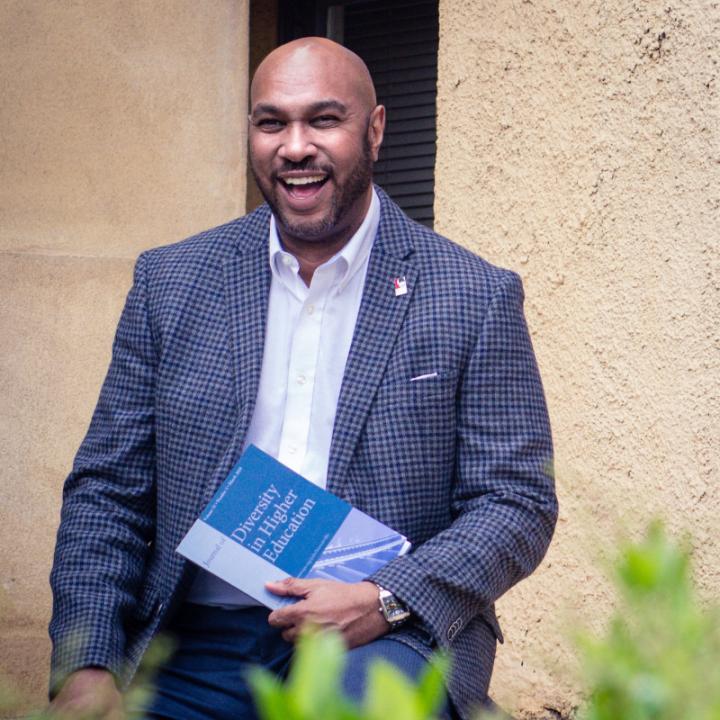Eric Abrams, chief inclusion officer for Stanford’s Graduate School of Education, was the featured speaker for POC-IT’s Black History Month event held Feb.15, 2022. During his talk, he expressed hope that everyone would leave the event feeling both curiosity about Black history and optimism about the American experiment itself, admitting that optimism can be very hard to come by these days.
A recurring theme throughout Abrams’ presentation was that Black history is often fragmented, as most Black Americans don’t know where their ancestors came from in Africa. In fact, only a small number of enslaved Africans were actually directly brought to the U.S.
“The story of people of African descent in the Americas is tragic, beautiful, depressing and inspiring all at once. For me as a man, as an educator, as an uncle, and as a dad, perhaps the word I find most appropriate is incomplete,” said Abrams.
Abrams described his childhood as the grandson of teenage sharecroppers and his grandparents’ eventual move to Oakland in the late 1930s, in parallel with the great migration of Blacks from the South in the 1930s and 1940s. This time period overlapped with World War II, in which many Blacks fought for our nation, including a Black woman who may have been the inspiration for Rosie the Riveter. The United States coming together to fight authoritarianism and racial hatred in World War II was a moment of optimism, one that Abrams hopes the country can achieve again.
He spoke of his maternal grandfather working for the Pullman Company, whose employees lived in a “closed loop” that served “like another exploitative labor system used in our country.” In contrast, Abrams’ father was not only the first person in his family to graduate high school, but also the first to attend college and law school. His father was also the first Black manager of a Bank of America branch in the U.S.
Despite the optimism he felt about his father’s success, Abrams faced a harsh reality, being called a racial slur for the first time as a second grader in Menlo Park.
The Unfinished Vision of Dr. King
Abrams discussed a more complete context around Dr. Martin Luther King’s ‘I Have a Dream’ speech as “a sanitized, whitewashed, and incomplete version of the story.” Pointing to the unfinished knowledge of Dr. King’s legacy, Abrams discussed Dr. King’s emphasis on economic inequality and how he hoped our country could address those inequalities.
Indeed, said Abrams, Dr. King’s vision is one of optimism, while also knowing that those who aren’t aware of that vision may find their own understanding of history to be incomplete.
Quoting a 1967 speech given by Dr. King about the Vietnam War, Abrams described the war’s effects on Black men who fought to guarantee liberties in Southeast Asia that they themselves didn’t have in the U.S. He compared the sanitation workers strike that led to Dr. King’s Memphis visit and assassination with events that have occurred in the last 30 years, ranging from the beating of Rodney King in Los Angeles to more recent incidents in Ferguson, Baltimore, Minneapolis and Oakland.
Although these events make it hard to believe things are changing for the better, Abrams reiterated that our understanding is incomplete; indeed, he says, there are reasons for optimism because people today are showing incredible courage in the face of overwhelming odds, arms, and force. For example, Dr. King wasn’t just killed because of his fight for racial equality, but more because of his fight against economic inequality.
The Impact of Inequality
“While Black history is important, the Black present and Black future are even more important. We shouldn’t recognize historical Black figures and then fail to support Black people in our own communities,” said Abrams. “Equal rights and justice are still not available to everyone in this country. And everyone bears the responsibility for improving the situation.”
In Oakland, where Abrams lives, he spray-painted ‘Black Lives Matter’ on the street in front of his house, yet one of his neighbors pressure-washed away the names of Black people who have been killed by law enforcement that a little girl chalked upon a public stairway. And the Oakland school board has decided to close a number of schools in predominantly Black and brown neighborhoods.
Despite his best efforts, said Abrams, some members of his family have fallen into what seems to be a nearly permanent and nearly intractable underclass. While he has been able to help children in his community see what their educational opportunities can be, he hasn’t been able to convince family members that they should pursue higher education.
“The story of Black people in this country is full of hope and optimism under crushing circumstances, but it has not yet been fully written,” Abrams said. “ And I hope you’ll join me in striving literally every single day to contribute to a happier ending than the beginning of the story.”
View the POC-IT Speaker Series: Black History Month, featuring Eric Abrams.


